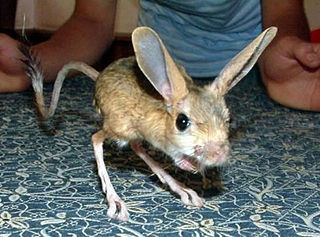
Jerboas are hopping desert rodents found throughout North Africa and Asia, and are members of the family Dipodidae. They tend to live in hot deserts.

Metatheria is a mammalian clade that includes all mammals more closely related to marsupials than to placentals. First proposed by Thomas Henry Huxley in 1880, it is a more inclusive group than the marsupials; it contains all marsupials as well as many extinct non-marsupial relatives. It is one of two groups placed in the clade Theria alongside Eutheria, which contains the placentals. Remains of metatherians have been found on all of Earths continents.
The Mohe, Malgal, Mogher, or Mojie were historical groups of people that once occupied parts of what is now Northeast Asia during late antiquity. The two most well known Mohe groups were known as the Heishui Mohe, located along the Amur River, and the Sumo Mohe, named after the Songhua River. They have been traditionally defined by the approximate use of what would have been Tungusic languages. The Heishui Mohe are commonly thought as being direct ancestors to the 12th century Jurchens. The Tang documented the Mohe as inhabiting the land of Sushen, to the northeast of the Tang, east of the Turks, and north of Goguryeo.

The family Aplodontiidae also known as Aplodontidae, Haplodontiidae or Haploodontini is traditionally classified as the sole extant family of the suborder Protrogomorpha. It may be the sister family of the Sciuridae. There are fossils from the Oligocene until Miocene in Asia, from Oligocene in Europe and from the Oligocene until the present in North America, where there is the only living species: the mountain beaver.

Sinodelphys is an extinct mammal from the Early Cretaceous, estimated to be 125 million years old. It was discovered and described in 2003 in rocks of the Yixian Formation in Liaoning Province, China, by a team of scientists including Zhe-Xi Luo and John Wible. While initially suggested to be the oldest known metatherian, later studies interpreted it as a eutherian.

Lo Wei was a Hong Kong film director and actor best known for launching the martial arts film careers of both Bruce Lee, in The Big Boss and Fist of Fury, and Jackie Chan, in New Fist of Fury.

Shek Wing-cheung, better known by his stage name Shih Kien, Sek Kin, Sek Gin or Shek Kin, was a Hong Kong actor and martial artist. Shih is best known for playing antagonists and villains in several early Hong Kong wuxia and martial arts films that dated back to the black-and-white period, and is most familiar to Western audiences for his portrayal of the primary villain, Han, in the 1973 martial arts film Enter the Dragon, which starred Bruce Lee.

Romance of the Three Kingdoms is a Chinese television series adapted from the classical 14th century novel of the same title by Luo Guanzhong. The series was produced by China Central Television (CCTV) and was first aired on the network in 1994. It spanned a total of 84 episodes, each approximately 45 minutes long. One of the most expensive television series produced at the time, the project cost 170 million yuan. It was completed over four years and involved over 400,000 cast and crew members, including divisions of the People's Liberation Army from the Beijing, Nanjing and Chengdu military regions. Some of the dialogue spoken by characters was adapted directly from the novel. Extensive battle scenes, such as the battles of Guandu, Red Cliffs and Xiaoting, were also live-acted.
Paleontology or palaeontology is the study of prehistoric life forms on Earth through the examination of plant and animal fossils. This includes the study of body fossils, tracks (ichnites), burrows, cast-off parts, fossilised feces (coprolites), palynomorphs and chemical residues. Because humans have encountered fossils for millennia, paleontology has a long history both before and after becoming formalized as a science. This article records significant discoveries and events related to paleontology that occurred or were published in the year 2007.

Deltatheroida is an extinct group of basal metatherians that were distantly related to modern marsupials. The majority of known members of the group lived in the Cretaceous; one species, Gurbanodelta kara, is known from the late Paleocene (Gashatan) of China. Their fossils are restricted to Central Asia and North America. This order can be defined as all metatherians closer to Deltatheridium than to Marsupialia.

Roy Chiao Hung was a Hong Kong actor. Nicknamed "the Lion of Cinema" for his athletic physical stature and powerful screen presence, he was a popular leading man throughout the 1950s and '60s, and continued his acting career well into the 1990s. He was an early star of wuxia films associated with the Hong Kong New Wave, thanks to his roles in A Touch of Zen (1971) and The Fate of Lee Khan (1973), both directed by King Hu.
Karydomys is a genus of fossil Eurasian hamster-like rodents in the subfamily Democricetodontinae from the Langhian stage in the middle Miocene epoch.
Ekgmowechashala is an extinct genus of primate belonging to Adapiformes.

Deltatheridiidae is an extinct family of basal carnivorous metatherians that lived during the Cretaceous and Paleogene. They were closely related to marsupials. Their fossils are restricted to Central Asia and North America. They mostly disappeared in the KT event, but a ghost lineage, currently represented by Gurbanodelta, survived until the late Paleocene by decreasing in size and becoming insectivorous.
This paleomammalogy list records new fossil mammal taxa that were described during the year 2013, as well as notes other significant paleomammalogy discoveries and events which occurred during that year.
This paleomammalogy list records new fossil mammal taxa that were described during the year 2011, as well as notes other significant paleomammalogy discoveries and events which occurred during that year.
The China women's national artistic gymnastics team represents China in FIG international competitions.
Siamoperadectes is a genus of non-marsupial metatherian from the Miocene of Thailand. A member of Peradectidae, it is the first member of its clade known from South Asia, and among the last non-marsupial metatherians.

Love O2O is a 2016 Chinese romance film directed by Zhao Tianyu and starring Angelababy and Jing Boran. It is based on the novel of the same name by Gu Man. It was released in China on 12 August 2016.










